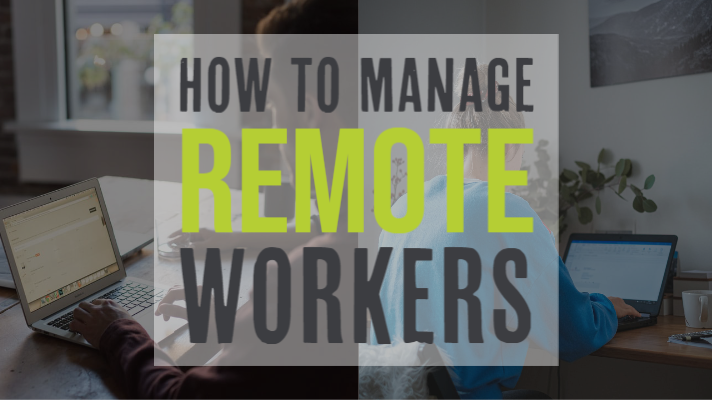
Watch our Latest Webinar on Amazon Web Services (AWS) with .Net Core


Employees leave managers, not companies. At least that’s what they say but is it true?
Perhaps. What is certain, however, is that of many of the reasons cited by people leaving their jobs, the vast majority stem from issues concerning the management, be it directly or indirectly. Money, benefits, training, technology, processes, progression, culture, and so on, are all in the hands of managers to influence or change. However, these are relatively easy things to improve upon, if motivated to do so.
Worse offenders are the common management behavioral traits that frequently cause people to update their CVs.
Pulling insight from all corners of our candidate interviewing experience, here are 3 classic managerial approaches that routinely upset team members and sometimes cause them to seek alternative employment.
When people join a company, they do so fully believing the dream sold by the hiring manager during the interview and offer stage. Naturally, plans change and unforeseen events occur which can hinder a manager’s ability to make good on their promises, but all too often senior dreamers get carried away in interviews, appraisals and other meetings with a lot of promising, exciting talk without any real ability or intention to follow through.

Guess what? People don’t like to be let down and when it happens, they talk about it. Not just internally either! To their friends, family and worse, their next series of competitor interviewers and later, with their new boss and colleagues, eager to hear the gossip from a rival. Times that by the number of people a manager has disappointed and, over time, the numbers really add up. Before you know it, the company has a reputation for making false promises making it hard to attract and retain staff.
A manager stealing an idea or taking unearned credit is a low, selfish and shameless punch below the belt for anyone to experience and yet, its surprisingly common. Victims are left helpless, often unable to prove otherwise, and even if they can, what further suffering would lay in wait for them if they dare make a challenge? So, they back down, lick their wounds, update their CV and leave.
So, now the short sighted, glory hunting manager has lost yet another valuable, creative professional capable of innovation good enough to impress the brass. Well done!
Most managers are impatient, especially those in charge of other managers, and are tolerated because often their impatience breeds pace and often returns results. However, the line is thin. Should they push their staff too far, they quickly become an over-communicating pest seemingly hell-bent on hourly distraction, like an overly enthusiastic back seat toddler. The stress this causes can quickly become intolerable and will, 100%, result in resignations. Management isn’t about head pecking. If it were, they’d be called Head Peckers, and aptly so.
The bottom line: Management styles vary greatly, each with their own set of pros and cons, however, how a person responds to lies, aggression, manipulation and disrespect is universal. Seems so simple! Ironically, many managers are blissfully unaware of the damage they’re causing to their own success by subjecting their own staff to these kind of behaviours.

Sorry to burst your celebratory bubble but the game is still on! Research by The Wynhurst Group found that a staggering 22% of staff turnover occurs within the first 45 days of employment. To make matters worse, those stats don’t include candidates dropping out before their start dates. Shut the front door I hear you say!
Eager as you may be to move on, the period between the candidate’s acceptance and start date is fraught with peril. Avoid an ‘out of sight, out of mind’ attitude and plan to avoid the predictable risks of inaction.
Here are a few of the major pitfalls and some ideas to help avoid them.

If you think your chosen candidate is great, so too will other people including current bosses, recruiters, ex colleagues, network connections and of course, other rival employers. Even the candidate’s own sense of entrepreneurialism can derail your plans. With so many people working from home now, in the daily habit of job searching, the threat of losing them is very real.
Your best weapon against all of them is speed. On the day of offer, strike while the iron is hot by having the offer letter and contracts ready to send, ideally by both email and post. Help them to feel part of the team at this early stage by ensuring the letter contains warm, welcoming details describing the plan, before and after, their start date, including any special instructions for remote working if appropriate.
Encourage them to resign at the first opportunity by asking for a start date commitment and keep in touch throughout their notice period. If you’re using an agency, check the consultant is in touch with the candidate too.
Your desirable candidate is good and will likely be offered more money to stay with their current employer. Remember your own recruiting headaches – Even if the company is upset by the resignation, it is often cheaper and easier to increase a salary instead of the expense and effort of recruiting someone new. Expect counteroffers.

Counteroffers can generally be beaten simply by making a good offer in the first place combined with a challenging and exciting career opportunity. Generally, people move for emotional, career-focused reasons and not for money however, the salary is still important. Offering someone a like for like salary leaves you wide open for a challenge. Ensure the whole package is appealing to ensure your candidate won’t be talked into staying. Wise employers keep some of the recruiting budgets aside just in case they need to increase the offer.
Before starting a recruitment campaign, think about the end and map the process journey in between. The end, by the way, is when a happily inducted, settled and well performing employee successfully passes their contracted probation period. Depending on your contracts, this may be up to 6 months. Plan events for every stage from casual team introductions to more involved professional meetings during the notice period, first day induction, job objective setting, reviews and appraisals. Stick to the plan and pay attention to red flag signals of discontent. Addressing issues quickly will help to overcome any risk.
For a new starter, there is nothing worse than feeling like an afterthought on day one. Book time to properly prepare for your candidate’s first day and ensure all required personnel is informed and equally prepared ahead of time. Ideally, include an induction timetable in the welcome letter with clear instructions on what to expect. Remote starters are more challenging, so ensure they are made to feel welcome. We have seen companies set up a ‘buddy’ system rota with a select group of colleagues who can help and guide your newbie through their early days. WhatsApp groups, teams, etc are just some of the digital solutions you might consider.
Avoid the classic unprepared faux pas by arranging for all equipment including pens, phones, computers, etc are with them, ready to use before the candidate sits down on day one.
If they are working on-site, don’t let them loose at midday to find their own way. During the morning, invite them to join you and/or members of the team for lunch to immediately build rapport and allay any social fears.
Be imaginative with your welcome approach. Google search some ideas of what others have done. You might be surprised!
16.45% of all candidates leave their job within the first week due to a ‘bad’ first impression.
During the first 45 days, your new employee is constantly assessing, comparing, and judging the reality of the job versus the dream-like picture painted during the interview process. Don’t allow their polite reluctance to complain to lull you into a false sense of security. Find out.
Create opportunities for open conversation and encourage honest feedback throughout the induction process and beyond. Address issues as they arise and take immediate action where possible to demonstrate your desire to support them.
Manage expectations. It’s the secret to the whole show. Meet commitments, be honest about the job and company culture, and stay in touch with them as much as possible.

Some of the biggest challenges for employers managing remote teams, often for the first time, include workers struggling with loneliness, managing their time, and communication among staff members.
What’s more, as the government starts to impose tougher restrictions ahead of the ‘second wave’, companies may be forcing their staff back to the remote environment.
While this all can be tough, finding a practical strategy that works can help you and your team make it through these trying times. Here are a few points that some of our homeworking managers have shared with us that might offer some much-needed wisdom!
While many of us may have acclimatized to the remote working lifestyle by now, a large proportion of the job market have been trust back into the office environment again after following government orders. Consequently, transitioning back into remote working is a difficult pill to swallow for managers and employees alike.
Make no mistake, inexperienced remote workers have been suddenly thrust into unfamiliar working environments and their daily routines are all over the place. With that in mind, ensure you give your team crystal clear expectations of what you want them to achieve. Clear direction from you takes the pressure off them and helps everyone to know what success looks like to you. It may be worthwhile weighting their job descriptions if the balance has shifted due to home working so your team understands what aspects of their role takes priority.
If your team were in the office, would they have regular access to you? If that is the case, things should not change for them when working from home.
At the start of working from home, you may have had to contact your staff on a regular basis to avoid any feelings of loneliness/isolation, until things settled down. While you and your staff may be in the swing of things, it’s still extremely important that a clear line of communication is continued and you manage your staff as if they were in close proximity to you.
People need to feel part of the team, now more than ever.
We’re probably all sick of the thought of Zoom meetings (both in a professional and personal capacity), but truly, what would we do without it?
We are very lucky nowadays to have so many communication options available to us. Using video conferencing is a really inclusive way of holding a meeting with your team Microsoft 365’s Team, Zoom, and Google Meet amongst many others are great ways of very easily holding a face to face team meeting. Telephone Conference calls, Facetime and Skype are other ways to keep in touch when you can’t physically meet with your team. Whatever you choose, try to forge an inclusive contact plan that offers everyone consistency, routine and the chance to be heard.
Notice one of your team is not themselves? Follow up with a call and use Video-Based Coaching to help them, regular contact will help you spot such issues. Working alone from home is not for everyone. For some, being alone all day is their idea of hell while others are more than happy in their own company. Keep in mind that everyone tends to offer a brave face – be careful not to ignore the signs.
A particularly useful method we have employed here at Langley James is employing a ‘buddy-up’ system, whereby two employees maintain regular contact and catch-up with one another.
Maintain focus by setting objectives and use a progress monitoring system to keep people on track. It’s vital your team understands why you need to follow their progress to avoid feelings of distrust. Instead, this is about the business remaining on course for success while helping you to foresee any issues, offer extra support or opportunities to improve the process.
You might feel unsure as to whether the work will get done to the same standard as if they were in the office. To cope with this, set up work-from-home guidelines, e.g. emails must be responded to within 24 hours e.g. use text for urgent matters, e.g. no calls between certain hours to make sure teammates are not working around the clock e.g. limiting social media usage etc. Set the rules and trust the team to follow them. If they don’t, it’s easy to refer to the rule and avoid conflict and negativity.
With this being said, the same rules apply for employees who are working overtime. Indeed, many employers are finding that their staff cannot switch ‘work mode’ off after hours. It’s hard when your computer is just sitting there. The temptation to answer emails and calls on a Sunday evening has become a frequent occurrence for many of the working-from-home army in recent months.
With no-scheduled holidays to look forward to and an impending second lockdown on the horizon, it’s important to remind your staff that they need to avoid those feelings of ‘burning out’ and ultimately ‘switching off’ when the day is done.
Ensure that any news in the business is always circulated to home workers at the same time that the rest of the team are being made aware. There is nothing quite as demotivating as finding out a business critical decision from someone else in the business who was made aware before you – frankly it just makes people feel second class.
Remember, this peculiar remote environment employees have been thrusted into will have mental implications for many – with feelings of anxiety, stress and loneliness at its highest. This is only exacerbated by the economic effects as a result of the virus, with many employees fearing that they may be made redundant. The remote work is likely to make staff overthink about their position within the company, so being as open and transparent as possible will be crucial for work productivity and morale.
Ensure that home workers still feel part of the overall company vision and how they fit in. To work productively people need to know that their efforts are contributing towards the overall goal. Yes, this crisis might have thrown a cat amongst the pigeons and changed the short/medium term vision, however that change needs to be properly communicated to maintain motivation and focus.
Ensure your team has the tools to do the job. Broadband is absolutely critical for most of us however, connection reliability may be an issue, especially in more rural areas. Suggest alternative venues for employees struggling with this issue such as working with other colleagues, friends or family. Look for alternatives like Dongles, mobile phone hotspots, etc and try to offer solutions instead of problems for your staff to solve.
Managing a productive team remotely begins with a strategy for communication. Be aware of how disruptive ‘over-communication’ can be to your day and set out a process so your team knows when it’s appropriate to call you. First, arrange for the appropriate number of weekly formal “report-ins.” Second, set guidelines about daily needs. Some people work better with a shopping list of questions and thoughts while others like a trickle. An understanding of what is urgent will further mitigate inefficiency, allowing ultimate productivity, maybe asking team members to question “ Is it Urgent?” or can it wait. Encourage email or instant messages for less urgent issues reserving phone call interruptions for the meaningful stuff. That all said, be aware that some of your team may need reassurance or guidance to be productive so assess on a case by case basis.
Empathise and appreciate your team member’s life by discussing family, commonalities and shared beliefs you employees would normally discuss this in the office with their colleagues, its worthwhile investing this time in getting to know them. Show you are supportive of their success by using inquiry to help them achieve their goals rather than check on their progress and numbers. Avoid closed questions like, have you done X?, or did you manage to call Y? You have no idea what they have had to deal with and so, if something has interfered with the plan, the only answer they can give is negative resulting in humiliation and defensive confrontation. Instead ask, What progress have you made on X? or, How’s your morning been? Qualify the situation first and then ask more detailed questions.
Ensure that everyone gets to know about achievements and make a real fuss, it will create a team feel good factor and let us face it we all need some good news at this unusual time!
So, there you have it. Some really useful advice from people who’ve been through the highs and lows of remote working before. Welcome to the new normal!
Our expert IT recruitment consultants are here to take the pressure off you when recruiting someone new, permanent or contract. We liaise with candidates with the utmost care to ensure that their candidate experience is a positive one. Call us on 0207 788 6600 and let us help you Recruit Someone Worth Recruiting.
Recent Comments